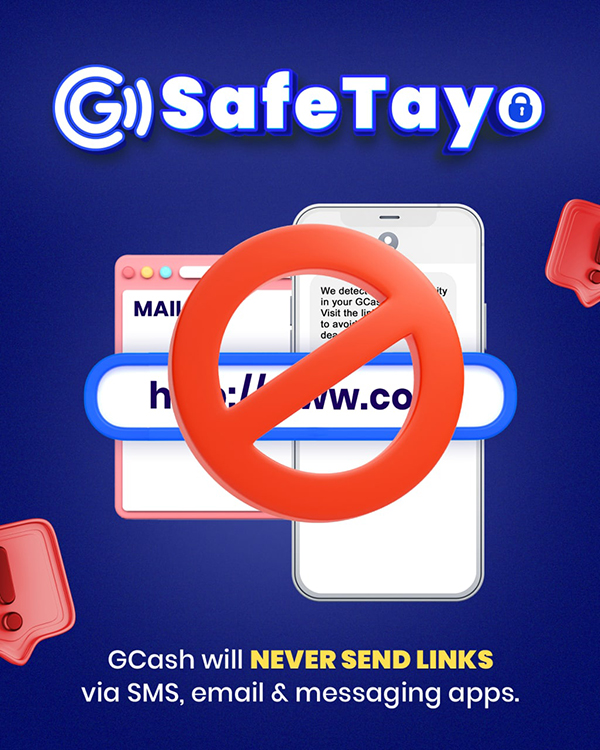In its continued commitment to protecting Filipinos against scammers and fraudsters, GCash, the country’s leading mobile wallet is ramping up security measures. In its latest move, GCash is removing clickable links in all emails and text messages to keep users from falling prey to fraudulent activities. Read more.
Don’t Click Clickable Links
People have always been reminded of ignoring suspicious clickable links in emails and text messages. But sometimes, users can automatically click links just because. This leads to good people being scammed of their hard-earned money.
To prevent this, GCash has made the hard move of removing clickable links from SMS and emails. The new update is being implemented in response to the growing incidence of fraud, particularly Account Takeover (ATO) which is a type of phishing scam where fake GCash emails or messages are created by fraudsters to trick users into clicking on a link or fake websites to get information such as their GCash number, OTPs, or MPINs.

An Added Layer of Protection for GCash Users
By removing links in emails and SMS, GCash ensures users are only getting legitimate messages for GCash transactions. It also assures users that GCash will not send clickable links through said channels to keep its user’s personal data and transactions in the app safe and secure.
“Removing clickable links in emails and SMS is an added layer of protection for our users. It is our utmost priority to safeguard their personal data and to ensure that GCash continues to be a safe and secure finance app for millions of Filipinos. This is part of our relentless efforts to strengthen and implement state-of-the-art security measures to make sure that our users’ personal information are safe and that fraudsters and cybercriminals are apprehended,” GCash president and CEO Martha Sazon said.
Personal Data Protection
GCash protects personal data and accounts of its users by employing various security measures. These include cyber threat detection and analytics, vulnerability scanning, as well as incident response and forensics.
Through its amplified #GSafeTayo campaign, GCash urges its users to be extra vigilant when making transactions on the app and reminds users to never share their MPIN or OTP, as well as to never click links outside of the GCash app, especially from websites or senders which you have not verified to be legitimate.
Aside from ramping up its educational campaign on how users can protect themselves from scams, GCash has also been proactively teaming up with authorities to go after cybercriminals.
“GCash has been a solid partner of the Philippine National Police Anti-Cybercrime Group (PNP-ACG) and other law enforcement agencies in clamping down on scammers. As we make more arrests, may it serve as a stern warning to criminals that we are vigilant and adamant in making sure perpetrators are put behind bars,” said Ingrid Beroña, GCash Chief Risk Officer. “Through these combined efforts, our users can rest assured that their funds and data remain safe and secure with GCash.”
Report GCash Scams
To report scams and fraudulent activities, visit the official GCash Help Center at help.gcash.com/hc/en-us or message Gigi on the website and type, “I want to report a scam.” GCash reminds its users that it will NEVER send personal messages to address concerns or get personal information, especially the MPIN and One-time Pin (OTP). Customers can also contact the official GCash hotline 2882 for queries and other concerns.
You may also like
7 Tech Solutions to Familiarize Yourself With for Your New HR Career
Stain and Scratch-Resistant realme C63 Now Available for P8,999
BDO Says: Clients Should Stay Calm and Vigilant to Avoid Scams
Manage Work-Life with Logitech Signature Slim K950 Wireless Keyboard
AI Portrait Master HONOR 200 Series is Coming Soon in PH
